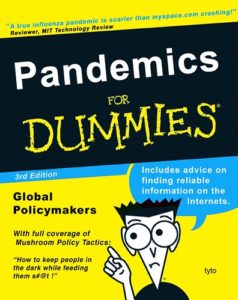
Where to begin?
The mistakes started with the ignoring of the warnings that the virus was coming to our part of the world. And then there was the mask confusion. You don’t need one. Actually one might help. OK, they definitely help and should be mandatory.
The testing and the contact tracing was also a disaster. Not only in its conception, but also in its execution. Drive-through centres in every parking lot and phone-based apps that would inform us if we had been exposed which, in hindsight, seem like fairy tales from a more hopeful time.
The procurement and production of personal protective equipment and the lack of inventory in our collective national strategic stockpiles has laid bare the pure embarrassment of how we ignored warnings and did not invest in the most basic of resources. Still today we face shortages of items that were in shortage a year ago.
The rush to approve therapeutic agents without ample evidence. The travel bans and limitations on personal gatherings which were conveniently forgotten by the wealthy and the government officials who hosted maskless parties or who sunbathed on the beaches of faraway lands while we all hunkered down.
The decision to close schools but keep pubs open. The decision to build and allocate more critical care beds for COVID-19 patients but not to staff them with critical care nurses and critical care doctors which, even to the untrained eye, seemed completely obvious.
After all, without the trained personnel they are just beds. It’s the people managing the beds that make them critical care beds. Not the beds themselves. The late recognition and admission of airborne transmission of the virus which fundamentally altered our view of indoor congregation and may have helped accelerate the case load.
And there were other mistakes too. But one is exceptionally egregious: the failure to plan for the vaccine roll out.
Let’s be clear about the fact that we have known since January 2020 that a vaccine was in development. We have known that the two frontrunners would require mild-to-extreme refrigeration.
And we have known that there was going to be some vaccine hesitancy. We have also known that the necessary redundancy required in our global supply chain would be stress tested as we needed billions of needles, stoppers, glass vials, cartons and swabs.
We have known that distribution of vaccines to big cities and geographically remote areas would require public and private sector involvement. We predicted the need for a sophisticated vaccine tracking system so that we knew who got their first dose but not their second. Or both. Or none.
We needed this tracking system, not to satisfy airlines and hotels who insisted upon it as the minimum foundation for a ‘return to normal’, but to satisfy the most basic public health requirements, including the need for robust pharmacovigilance.
And as we sit here in the terrible, apocalyptic winter of 2021 that every epidemiologist predicted, with increasing case counts, hospitalisations, deaths and more virulent mutations circumnavigating the globe, we basically have none of what we knew we needed twelve months ago.
This is our great global tragedy. That with tens of millions of doses sitting in fridges in North America, only 40% of available doses have been used. The onslaught of the initial virus caught us all flat-footed. But there is no excuse for this.
We have to ramp up inoculations, prioritise people in the right order and notify them when it’s their turn and get them vaccinated. We must open stadiums and shopping centres and use every available resource at our disposal. We must give people paid time off to line up and get vaccinated. We must train more people to help deliver the vaccines.
The apologists will point to this as being the greatest logistical challenge in over a century. They will say: ‘But look at how much we’ve done already.’
They will defend the government and point to the fact that managing a herculean problem while planning for another herculean problem is too much to ask. But, of course, they will be wrong. For this is exactly what governments do and why they exist.
It is the ability of the government to manage the problems of today while keeping their eye on what is needed tomorrow that is their raison d’être.
Nobody is asking for miracles. Nobody is suggesting that there is a single magic bullet that can pull us out of this situation overnight.
All we are asking is that the people in charge do the things that have to be done, today and tomorrow, that they knew they would have to do 12 months ago.
The mistakes are plentiful, but one stands out as most egregious
This article was originally published here.